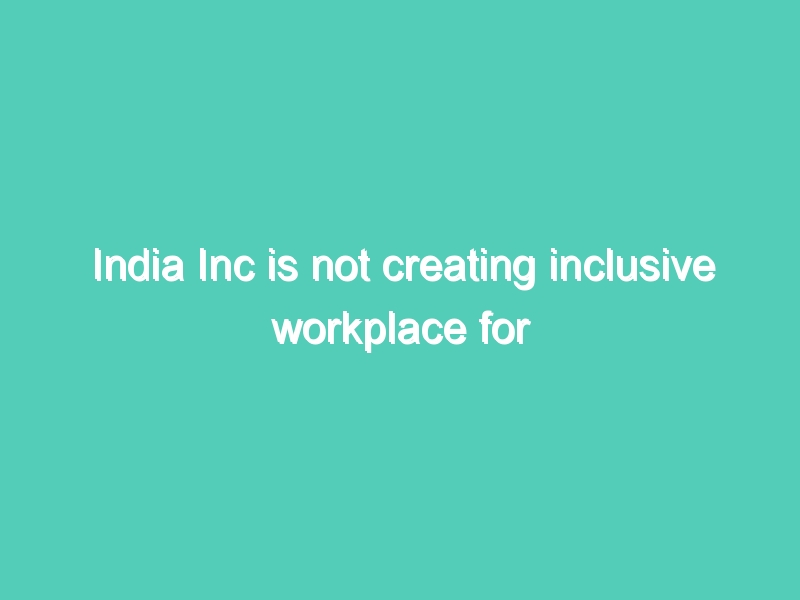By Rashmi Ramesh and Nishtha Sabharwal
For Shyam Balasubramanian, life is tougher than most of his colleagues at the chip-designing firm in Chennai where he is working. Reason: his sexuality.
Balasubramanian, a transman, says the management is extremely supportive, but that doesn’t stop the teasing and bullying he has to face from elsewhere over his sexual identity.
“I’ve been teased and bullied through school and college, and for the most part of my professional life,” says Balasubramanian, who has been working for nine years. “All this bullying makes connecting with my peers very tough. Something as simple as gaining knowledge becomes hard because people refuse to talk to me and share information.”
Indian companies are increasingly taking steps to make the workplace more diverse and inclusive, but much of these activities are about recruiting more women, that too often for supporting, and not leadership, roles.
People with disabilities (PwD) and LGBTQ+ (lesbian, gay, bisexual and transgender) communities usually find little space in HR strategies, although there are exceptions. Despite the Supreme Court making gay sex legal, people are frowned upon for their sexual orientation.
Workplaces have come a long way on diversity and inclusion (D&I) compared with what they were even five years ago, but they still have much more to cover, says Rashmi Vikram, senior manager at Community Business, a not-for-profit that looks to tackle workplace inequality and promote social inclusion. “While gender diversity has been a key driver for D&I, many other streams like PwD and LGBTQ+ still have a long way to go.”
Findings from a 2018 TimesJobs survey highlight the general attitude at the Indian workplace. As much as 57% of the participants responded in the negative to a statement that their companies openly recruited LGBTQ+ and candidates with disabilities. More than 55% said they still experienced bias at workplace, including over gender, ethnicity and sexual orientation.
This despite most companies having formal policies in place to stop discrimination and harassment at workplace and some even having dedicated diversity officers to drive change. According to Nirmala Menon, founder of Interweave Consulting, the primary role of such D&I professionals is to create and sustain a safe, respectful space for employees, and enable a work environment where everyone can bring their whole and best selves to work. But, at times, the executives who are supposed to ensure equity at workplace are found to be at fault themselves.
In September, IT firm Tech Mahindra sacked its chief diversity officer, after an internal investigation found that she had discriminated against and harassed a former employee over his sexual orientation. It isn’t unusual to face such harassment at workplace over one’s sexual identity, says Balasubramanian. “I’ve heard derogatory comments from my peers on how I look, my sense of style and how I generally live my life.”
SLOW CHANGE
But changes are happening, say diversity experts. The speed of that, though, is slow, as organisations often need to first bring in a change to the work culture at their offices, and sensitise staff about even unconscious or unintended bias, before openly inducting employees from the LGBTQ+ communities. Another impediment is that they may also have to create enabling infrastructure, such as toilets, for employees from the LGBTQ+ and PwD communities.
“Every employee should go through a mandatory sensitisation programme. Usage of right pronouns, respecting preferred gender identity, comfort to use their restroom of choice (if there is no genderneutral restroom), immediate escalation matrix if any homophobia is experienced and a zero-tolerance policy are very important,” said June A, programme manager at Solidarity Foundation.
“As more inclusive measures, the company can provide easy accommodation options, insurance coverage for SRS (sex reassignment surgery) and same-sex partner benefits. Companies have to practice equity, not just equality.”
Solidarity Foundation recently joined Capgemini and Royal Bank of Scotland (RBS) to organise a workshop to help companies take forward actionable points to strengthen transgender inclusion.
Srikanth Suvvaru, chair of RBS India Rainbow Network and head of candidate attraction and engagement at RBS, said the bank initiated inclusivity policies because the management wanted it to be a place where people could bring their true selves to work. “We worked on policies that would bring in inclusivity for all our employees, showed public support by participating in pride parades, and educated and sensitised people on what it means to belong to the LGBTQ+ community and what challenges they face within the corporate space,” Suvvaru said.
RBS was the first company in India to publicly extend medical benefits to same-sex partners and give surrogacy leave irrespective of the partner’s gender.
Kolkata’s Medica Superspecialty Hospital is not only hiring members from the transgender community, but also helping skill them. “Medica has a tie-up with a vocational institute providing training to people from the community. Depending on the requirement and demand in the sector, we look at possible hires from the institute. We are also approaching NGOs and associations to let them know about our inclusive recruitment policy,” said Sudhanshu Roy, president (group HR) at Medica.
The hospital recently hired two paid interns from the transgender community as operation-theatre technicians. Jyothsna Hirode, who has been working in the field of D&I for more than a decade, suggests unbiasing workshops — these help participants stand in the shoes of those who are excluded — as a step for sensitisation toward inclusion. Unwavering support from the leadership is a must.
MARGINALISATION OF PWD
If there are discussions ongoing around hiring women and also people from the LGBTQ+ community, the marginalisation faced by persons with disabilities has been stark for many years now. The challenge, experts believe, is that it requires a lot more conscious decision by the organisation to make employees and infrastructure, including training and skilling, more PwDfriendly.
Many organisations don’t even have PwD-friendly toilets. According to the TimesJobs survey, 25% of employees think their organisation’s management is not committed to meeting the needs of employees with impairments or disabilities. Even the IT-ITES industry, which is in the forefront for fostering changes to workplace culture, is lagging when it comes to PwD hiring.
A Nasscom study had found the representation of people with disabilities in the industry headcount at a paltry 1%.
EVENT-BASED INTERVENTION
Experts say it is imperative for today’s organisations to be diverse.
“Every organisation is at the risk of facing disruption, and the best way for you to safeguard yourself is by making sure that your organisation has the ability to look at every issue from different perspectives, rather than just have clones who all come from same backgrounds, same experiences and will mostly have the same viewpoints,” says Ronesh Puri, managing director of headhunting firm Executive Access. While that may be the case, many companies in India find it difficult to articulate a compelling business case for why they are focusing on a specific D&I approach, says Vikram of NGO Community Business.
“We observed that some companies may have started to focus on it because it is a current business trend, the ‘right thing’ to do or because it is mandated by the firm’s global headquarters,” she says. “As a result of not always having a clear business case, for some companies, D&I has become an initiative or event-based intervention rather than a well-developed strategy linked to business goals.”
This is probably the area where more change is required for wholesome and true inclusion to happen at our workplace.


